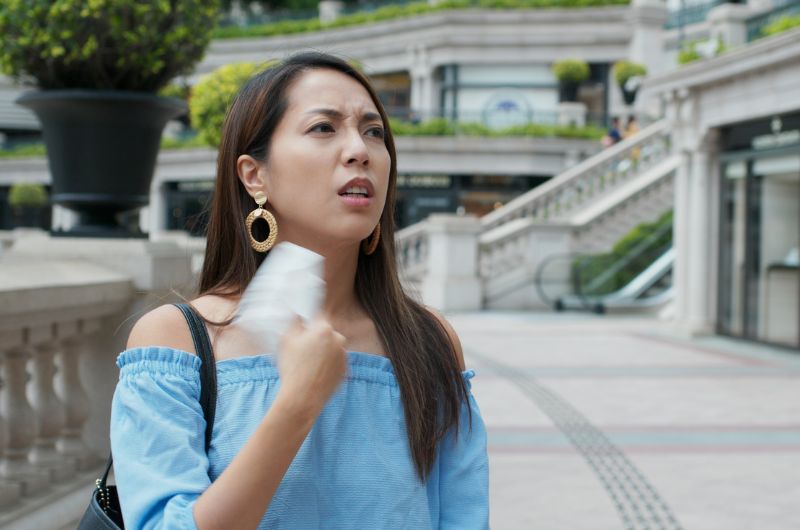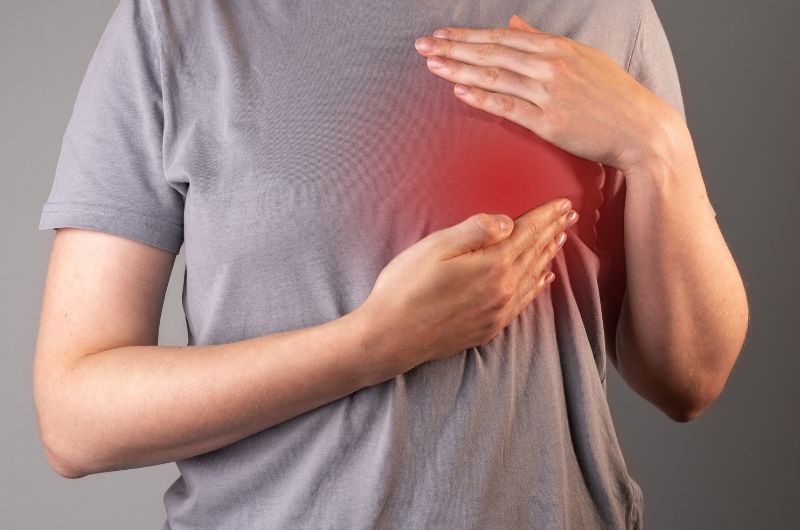Breast tenderness after a hysterectomy occurs when there’s a decline in the ovary or when the ovary is removed, resulting in a drastic hormonal change that leads to surgical menopause. There are treatment options to balance these hormones to improve and reduce the complications mentioned. Breast pain is linked to hysterectomy when ovaries are removed due to hormonal changes.
Breast pain or often called breast tenderness, is a sharp pain or tightness that people feel in their breast area. The pain can occur constantly or occasionally.
Breast tenderness has two characteristics. It can be cyclic or noncyclic.
Refer to the guide below for which type of breast tenderness you are currently having.
| CYCLIC | NONCYCLIC |
|---|---|
| Most likely related to the menstrual period due to hormonal changes | Unrelated to the menstrual cycle |
| Dull, heavy, and full sensation can be felt | Tight and burning feeling |
| Progressively hurt from the start of the period until it’s done | Can constantly hurt |
| It affects both breasts, and the pain could radiate to the underarm | It usually affects one breast, and pain can be localized |
| Ages 20 – the 40s and those people transitioning to the menopausal stage (hot flashes) are the ones who likely experience it | Possible to occur after menopause but least common unless there are underlying conditions that can be considered |
When should I be concerned about breast tenderness after menopause?
The guide I shared above tells us that breast tenderness can also occur after menopause, albeit not as frequently.

Breast tenderness can strike unpredictably due to hormonal changes. Estrogen and progesterone level in women’s bodies may start to fluctuate, and it may cause changes in the breast shape and size as well as pain.
Monthly hormone fluctuations may happen, and so does pain. But again, it’s less common, so it’s not advisable to always assume that it’s due to hormonal changes.
Low estrogen can cause breast tenderness, especially when a woman is currently having her period, while too much of it can cause pain too since our breasts are very sensitive to hormone changes. This can be observed during your period, and when you press on them, you may feel pain.
It is normal to experience breast tenderness at some time, but when you age, it can be related to menopause and could be a symptom of another condition.
Below are some causes of breast pain for older women:
- Hormone Fluctuations
- Breast Cysts
- Breastfeeding
- Medications
- Breast Cancer
- Ovarian Cancer
- Breast Infection
- Poorly fitting bra
- Fibroadenoma
Can you still have menstrual symptoms after a hysterectomy?
The result of body changes from a hysterectomy procedure depends on its type. It depends on whether the whole uterus is removed.
Only a part of it, or in some cases, could affect the ovaries too and may require the removal of one or both.
When the ovaries are removed together with the uterus, it may cause rapid aging due to menopause, it might also increase the chances of weight gain, and your estrogen levels may drop rapidly.
This is why synthetic hormones should be taken, or there could be a need to undergo replacement hormone therapy to balance the hormones and prevent menopausal symptoms.
If both ovaries are kept, they will continue to function as it is, and there’s no need to undergo all of these.
What are the symptoms of hormonal imbalance after a hysterectomy?
📌 It takes 6-8 weeks until a body can recover from a hysterectomy procedure. Full healing may take 12 months before you can go back to your usual routine. Body changes will depend on the type of hysterectomy procedure.
The uterus does not have an impact on your hormone levels, but the ovary does. Also, take note that losing it will also cause your ovaries to decline, which could lead to menopause.
Getting a hysterectomy does not mess with your hormones since it’s the ovary that produces them.
Losing even one ovary can have a slight decrease in hormone production, but it still will function as normal and will continue to produce eggs and hormones. But once your ovaries start to decline, it might lead your estrogen to drop, and the menopausal stage begins.
As you know, your estrogen is responsible for maintaining and developing women’s reproductive health and features – such as breasts, body shape, etc.

This is why hormone replacement therapy or taking hormones is recommended so that you won’t experience complications for estrogen loss that are mentioned below:
- Difficulty sleeping (night sweats)
- Hot flashes
- Bone density loss
- Rapid aging
- Increased risk of heart disease, stroke, depression, and anxiety
What are the symptoms of low estrogen after a hysterectomy?
As mentioned, it is recommended to take hormonal replacement after a hysterectomy, but not all cases are required to.
Women who only have their uterus removed will not undergo surgical menopause. Thus, their ovaries will continue to function and produce estrogen.
Other than the mentioned complications above, sudden estrogen loss can lead to more severe symptoms.
According to WebMD, an ERT only or Estrogen Replacement Therapy alone is recommended for those women who have both their uterus and ovaries removed.
While a combination of estrogen and progestin should be taken for those who have removed their ovaries only.
Progestin is combined since taking estrogen alone could increase the risk of Uterine cancer; adding it removes the risk.
You could also opt for a natural hormone replacement therapy like…
- Bioidentical Hormone Replacement Therapy (BHRT)
- or Traditional Natural Hormone Replacement Therapy (TNHRT).
The first one came from synthetic hormones derived from plant estrogens which replace your hormones.
While the second ones are some plants and supplements that could be taken to only relieve your hormonal symptoms.
You need to undergo any of this hormonal therapy so you can prevent surgical menopausal symptoms and the list of complications mentioned earlier.
Also, your body might still need to adjust for the first 6 months after your hysterectomy procedure, as it’s an invasive surgery that needs downtime healing. There should be minimal pain and discomfort as time goes by.
If pain persists, you might want to consult your doctor, especially if you have a breast pain medical history.
FAQs
Will I experience breast tenderness even when I only had my uterus removed?
It is possible, but it will be less likely to happen. You keep both ovaries from the surgical procedure, so your ovaries still function normally.
Experiencing breast tenderness from which age is normal but hormonal changes are not always the reason. If the pain does not go away after a week, you might need a doctor’s consult.
When I undergo hormonal therapy, will It reduce breast tenderness from happening?
As I mentioned, it’s pretty normal to experience breast tenderness from hormonal imbalances. But yes, it will eventually reduce the treatment.


